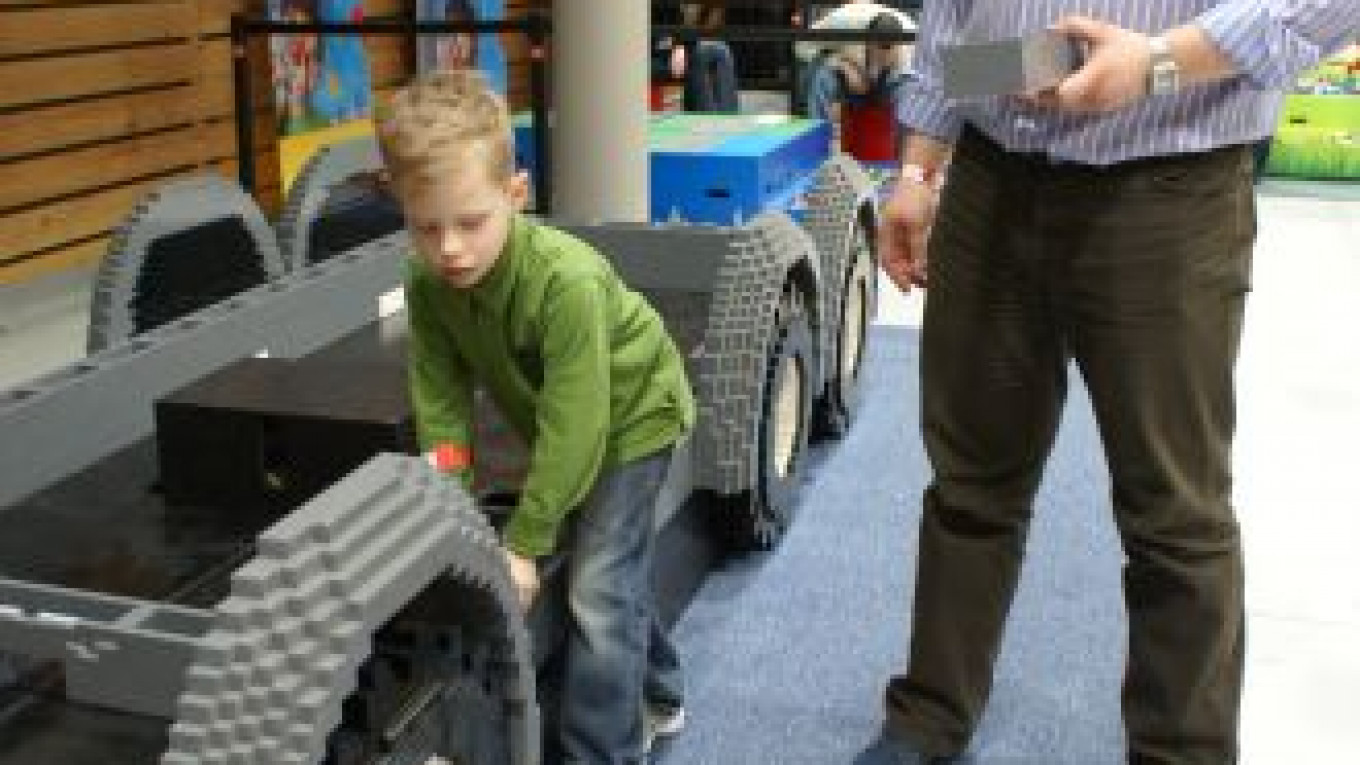Kids and adults can play with a million Lego bricks at the Journey to the Future exhibit as the famous building blocks are put at Muscovites’ disposal until the end of the month at the Ogo-Gorod family center.
The exhibit is divided into three areas — buildings, nature and vehicles — and various Lego scenes are already in place, such as a construction site with cranes and diggers that move at the press of a button.
Supervisors are on hand in each department ready to give ideas, help build or just hand over a brick when needed. The exhibit is free on Mondays but costs 200 rubles on other weekdays and 300 rubles on weekends.
“First I show them how to make a foundation, so it’s solid,” said one supervisor, Pyotr Prokopenko. “Then I use my imagination and fantasies — I remember playing with it as a kid.”
Sasha, 9, didn’t need any help as he put together an oil rig. “I like this exhibit. Lego is my whole life,” he said. “I have 10 or 20 [kilograms] at my dacha.”
Nearby, a girl was halfway through building a house, odd spider-like figures with varying numbers of arms and legs stood ready to pounce, and cars straight out of wacky races hung from a huge globe.
The center also caters to younger children with an area where toddlers could be seen attaching Duplo bricks — bigger than Lego and easier to use — to a structure already higher than themselves.
In one corner a giant fire engine was coming to life as staff helped kids put the bricks in the right place.
Andrei Kirakov, 6, was concentrating hard as he built a video handset.
“He plays with Lego every day or two,” said his father, also Andrei.
Other fathers around the exhibit were taking an active part in putting bricks together with their children. Some were just beavering away on their own.
As the children built, staff took photos of the new forms. “We will pick two or three of the best children’s constructions at the end of the day to display,” said the exhibit’s spokesperson, Vladimir Yedelev.
For the more high-tech builders, the Education Zone has robots that mix Lego pieces, sensors and engines to create sophisticated, if very blocky, robots.
Among the robots on show will be simple engines using Duplo, which organizers say will help show the basics of physics, and “a crocodile model that children will have to program to bite the finger of anyone who puts their hand in its mouth.”
Lego was developed in the 1940s in Denmark as a simple building block and has since expanded to include Lego-related video games, theme parks and film, among others.
To complete the Lego overload, the exhibit has two Playstation consoles with Lego-themed games on them and a Lego shop.
Journey to the Future runs till May 31. GravityDom hall in the Ogo-Gorod family center, 18 Pavlovskaya Ulitsa. Metro Tulskaya. Tickets cost 200 rubles Tuesday to Friday, and 300 rubles Saturday and Sunday. Free on Monday. Open 1 to 8 p.m. on weekdays, noon to 8 p.m. on weekends. Tel. 789-8232, http://ogogorod.ru, www.legoday.ru.
A Message from The Moscow Times:
Dear readers,
We are facing unprecedented challenges. Russia's Prosecutor General's Office has designated The Moscow Times as an "undesirable" organization, criminalizing our work and putting our staff at risk of prosecution. This follows our earlier unjust labeling as a "foreign agent."
These actions are direct attempts to silence independent journalism in Russia. The authorities claim our work "discredits the decisions of the Russian leadership." We see things differently: we strive to provide accurate, unbiased reporting on Russia.
We, the journalists of The Moscow Times, refuse to be silenced. But to continue our work, we need your help.
Your support, no matter how small, makes a world of difference. If you can, please support us monthly starting from just $2. It's quick to set up, and every contribution makes a significant impact.
By supporting The Moscow Times, you're defending open, independent journalism in the face of repression. Thank you for standing with us.
Remind me later.






